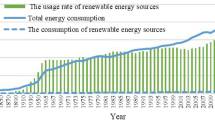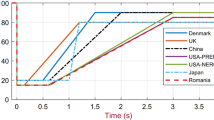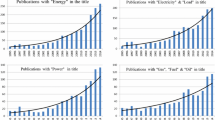Abstract
This paper describes an application of intelligence-based predictive scheme to load-frequency control (LFC) in a two-area interconnected power system. In this investigation, at first, a dynamic model of the present system has to be considered and subsequently an efficient control scheme which is organized based on Takagi-Sugeno-Kang (TSK) fuzzy-based scheme and linear generalized predictive control (LGPC) scheme needs to be developed. In the control scheme proposed, frequency deviation versus load electrical power variation could efficiently be dealt with, at each instant of time. In conclusion, in order to validate the effectiveness of the proposed control scheme, the whole of outcomes are simulated and compared with those obtained using a nonlinear GPC (NLGPC), as a benchmark approach, which is implemented based on the Wiener model of this power system. The validity of the proposed control scheme is tangibly verified in comparison with the previous one.
Similar content being viewed by others
References
Prasanth BV, Kumar SVJ (2008) Load frequency control for a two area interconnected power system using robust genetic algorithm controller. J Theor Appl Inf Technol, 1204–1212
Prasanth BV, Kumar SVJ (2009) Robust fuzzy Load frequency controller for a two area interconnected power system. J Theor Appl Inf Technol, 242–252
Lee HJ (2006) Robust load frequency control for uncertain non linear power systems: A fuzzy logic approach. Inf Sci 176:3520–3537
Erlugrul C, Ilhan K (2005) Fuzzy logic controller in interconnected electrical power systems for frequency control. Electr Power Syst 37:542–549
Chang C, Fu W (1997) Area load frequency control using fuzzy gain scheduling of PI controllers. Electr Power Syst 2:145–152
Rerkpreedapong D, Hasanovic A, Feliachi A (2003) Robust load frequency control using genetic algorithms and linear matrix inequalities. IEEE Trans Power Syst 18(2):855–861
Rebours Y, Kirschen D, Trotignon M, Rossignol S (2007) A survey of frequency and voltage control ancillary services-part I: technical features. IEEE Trans Power Syst 22(1):350–357
Park N, Lee D, Hyun D (2007) A power-control scheme with constant switching frequency in class-D inverter for induction-heating. IEEE Trans Ind Electron 54(3):1252–1260
Iwanski G, Koczara W (2007) Sensorless direct voltage control of the stand-alone slip-ring induction generator. IEEE Trans Ind Electron 54(2):1237–1239
Murakami A, Yokoyama A, Tada Y (2006) Basic study on battery capacity evaluation for load frequency control (LFC) in power system with a large penetration of wind power generation. Trans Inst Electr Eng Jpn 126(2):236–242
Vrdoljak K, Peric N, Petrovic I (2007) Estimation and prediction in load frequency control. In: Proc of international conference on energy and electrical drives, pp 785–790
Shayeghi H, Shayanfar H, Malik O (2007) Robust decentralized neural networks based LFC in a deregulated power system. Electr Power Syst Res 77(3–4):241–251
Flores A, Saez D, Araya J, Berenguel M, Cipriano A (2005) Fuzzy predictive control of a solar power plant. IEEE Trans Fuzzy Syst 1:58–68
Rebours Y, Kirschen D, Trotignon M, Rossignol S (2007) A survey of frequency and voltage control ancillary services-part II: economic features. IEEE Trans Power Syst 22(1):358–366
Huang H, Hsieh C, Chen K, Nat S (2006) Adaptive frequency control technique for enhancing transient performance of DC-DC converters. In: Proc of solid state circuits conference
Mohamed Y, El-Saadany E (2007) An improved deadbeat current control scheme with a novel adaptive self-tuning load model for a three-phase PWM voltage-source inverter. IEEE Trans Ind Electron 54(2):747–759
Mazinan AH, Sadati N (2009) Fuzzy predictive control based multiple models strategy for a tubular heat exchanger. Appl Intell (in press). Online available Feb 4, 2009. doi:10.1007/s10489-009-0163-1
Mazinan AH, Sadati N (2009) An intelligent multiple models based predictive control scheme with its application to industrial tubular heat exchanger system. Appl Intell (in press). Online available Jun 16, 2009. doi:10.1007/s10489-009-0185-8
Mazinan AH, Sadati N, Ahmadi-Noubari H (2009) A case study for fuzzy adaptive multiple models predictive control strategy. In: Proc of IEEE world symposium on industrial electronics, pp 1172–1177
Mazinan AH, Sadati N (2008) Fuzzy multiple models predictive control of tubular heat exchanger. In: Proc of IEEE world congress on computational intelligence, pp 1845–1852
Mazinan AH, Sadati N (2008) Multiple modeling and fuzzy predictive control of a tubular heat exchanger system. Trans Syst Control 3:249–258
Mazinan AH, Sadati N (2008) Fuzzy multiple modeling and fuzzy predictive control of a tubular heat exchanger system. In: International conference on application of electrical engineering, pp 77–81
Mazinan AH, Sadati N (2008) Fuzzy multiple modeling and fuzzy predictive control of a tubular heat exchanger system. In: International conference on robotics, control and manufacturing technology, pp 93–97
Mazinan AH, Sadati N (2010) On the application of fuzzy predictive control based on multiple models strategy to a tubular heat exchanger system. Trans Inst Meas Control, pp 1–24. doi:10.1177/0142331209345153
Mazinan AH, Kazemi MF (2010) A new approach to intelligent model based predictive control scheme. Intelligent Information Management, Scientific Research Publisher, pp 14–20. doi:10.4236/iim.2010.21002
Mazinan AH, Kazemi MF, Shahbazi H (2010) Innovations in generalized predictive control using TSK fuzzy-based approach. In: IEEE international symposium on industrial electronics, Italy, July 2010
Mazinan AH, Kazemi MF (2010) Notes on intelligence based model predictive control scheme: A case study. In: IEEE intelligent systems conference, UK, July 2010
Mazinan AH, Kazemi MF (2010) Design of an intelligent control scheme based on predictive theory. In: IEEE international conference on networking, sensing and control, USA, April 2010, pp 85–88
Mazinan AH, Kazemi MF (2010) An efficient solution to load-frequency control using fuzzy-based predictive scheme in a two-area interconnected power system. In: The international conference on computer and automation engineering, Singapore, February 2010, vol 1, pp 289–293
Olamaei J, Mazinan AH, Arefi A, Niknam T (2010) A hybrid evolutionary algorithm based on ACO and SA for distribution feeder reconfiguration. In: The international conference on computer and automation engineering, Singapore, vol 4, pp 265–269
Sousa JMDC, Kaymak U (2001) Model prediction control using fuzzy decision functions. IEEE Trans Syst Man Cybern—Part B: Cybern 1:54–65
Zhang Y, Chi Z, Liu X, Wang X (2007) A novel fuzzy compensation multi-class support vector machine. Appl Intell 27:21–28
Chen S, Chen S (2005) A prioritized information fusion method for handling fuzzy decision-making problems. Appl Intell 22:219–232
Huang S, Tan KK, Lee TH (2002) Applied predictive control. Springer, London
Clarke DW (1988) Application of generalized predictive control to industrial processes. IEEE Control Syst Mag 8:49–55
Sousa JM (2000) Optimization issues in predictive control with fuzzy objective functions. Int J Intell Syst 15:879–899
Zamarreno JM, Vega P (1999) Neural predictive control application to a highly non-linear system. Eng Appl Artif Intell 12:149–158
Gadkar KG, Doyle FJ III, Crowley TJ, Varner JD (2003) Cybernetic model predictive control of a continuous bioreactor with cell recycle. Biotechnol Prog 19:1487–1497
Saha P, Krishnan SH, Rao VSR, Patwardhan SC (2004) Modeling and predictive control of MIMO nonlinear systems using Wiener-Laguerre models. Chem Eng Commun 8:1083–1120
Franco E, Sacone S, Parisini T (2004) Practically stable nonlinear receding-horizon control of multi-model systems. In: Proc of IEEE conference on decision and control, vol 3, pp 3241–3246
Rueda A, Cristea S, Prada CD, Keyser RD (2005) Non-linear predictive control for a distillation column. In: Proc of 44th IEEE conference on decision and control, pp 5156–5161
Arefi MM, Montazeri A, Poshtan J, Jahed-Motlagh MR (2006) Nonlinear model predictive control of chemical processes with a Wiener identification approach. In: Proc of IEEE conference on industrial technology, pp 1735–1740
Abraham RJ, Das D, Patra A (2007) Automatic generation control of an interconnected hydrothermal power system considering superconducting magnetic energy storage. Int J Electr Power Energy Syst 29:571–579
Ngamroo I (2005) An optimization technique of robust load frequency stabilizer for superconducting magnetic energy storage. Energy Convers Manag 46:3060–3090
Ngamroo I (2005) Robust decentralized frequency stabilizers design for SMES taking into consideration system uncertainties. Electr Power Syst Res 74(2):281–292
Ibraheem A, Kumar P, Kothari DP (2005) Recent philosophies of automatic generation control strategies in power systems. IEEE Trans Power Syst 20(1):346–357
Kocaarslan I, Cam E (2005) Fuzzy logic controller in interconnected electrical power systems for load-frequency control. Int J Electr Power Energy Syst 27:542–549
Author information
Authors and Affiliations
Corresponding author
Rights and permissions
About this article
Cite this article
Mazinan, A.H., Hosseini, A.H. Application of intelligence-based predictive scheme to load-frequency control in a two-area interconnected power system. Appl Intell 35, 457–468 (2011). https://doi.org/10.1007/s10489-010-0236-1
Published:
Issue Date:
DOI: https://doi.org/10.1007/s10489-010-0236-1




